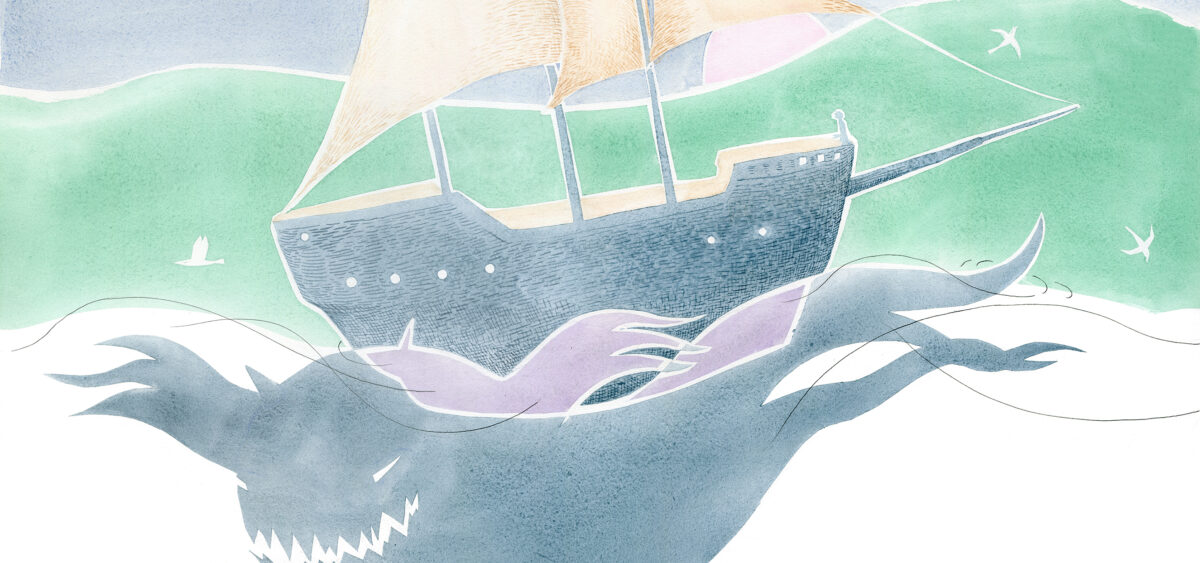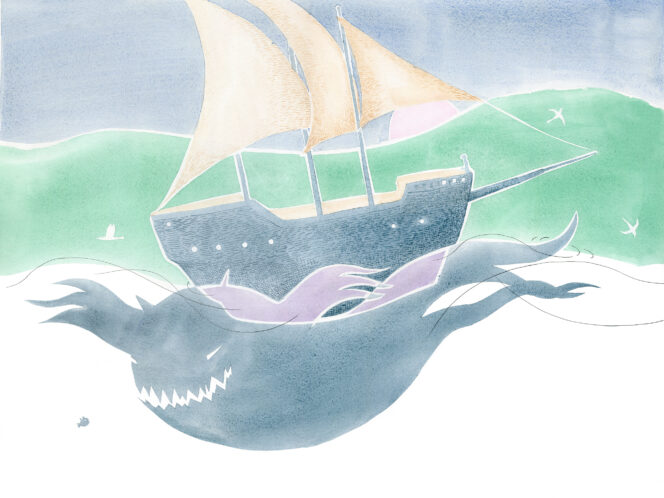
The Adventures of Sindbad the Seafarer is one of the most beloved Polish books for children. Written in 1913 by one of the greatest Polish poets of the century, Bolesław Leśmian, the book is loosely based on the stories of Sinbad the Sailor from the classic Middle Eastern collection One Thousand and One Nights. However, Leśmian developed this material very differently, introducing completely new episodes and characters, like Sindbad’s poetry-writing uncle, Tarabuk, and his cunning but sympathetic nemesis, the Sea Devil.
In the following excerpt from the book’s First Adventure, we find Sindbad in one of Leśmian’s newly-invented episodes. Our story begins as Sindbad is leaving the palace of King Miraz, to whose daughter he is now engaged, in order to visit the mysterious island of Kassel—the seat of the evil sorcerer Degyal. Perhaps the only thing that makes him a bit uneasy is the king and princess’s strange habit of mispronouncing his name as “Hindbad.” But, for now, this does not seem all that important.
Night fell. I was led to a palace chamber that had been prepared for me. I soon fell sound asleep, worn out with all my adventures. At dawn I woke refreshed and ready for my journey to Kassel.
By my chamber door stood a knight, waiting to lead me to the shore and direct me to the magic island. I followed him quickly to a nearby cove, where a small boat with two oars was moored. The knight pointed out a black dot on the horizon and told me to row the boat towards it. That dot was the island of Kassel.
Merrily, I leapt into the boat and rowed off.
Within six hours I had approached Kassel closely enough that I could hear the mysterious booming of the far-off gongs. I began to row the boat faster, and shortly reached the shore of the strange isle.
I jumped out and pulled the boat high up onto the sand to stop the tide from carrying it away. I ran further up the beach, looking around me in wonder. The island was completely barren, covered in rocks and boulders. The sound of the invisible gongs began to grow louder. Evidently, seeing me on his island, Degyal was making his gongs clash louder in order to stun me. My ears were filled with such a thunderous noise that I almost fainted. I made an effort of will to stay alert and walked on boldly.
Suddenly, I recalled Piruza’s words: “Degyal hides away from human sight, and, while remaining invisible himself, sees everyone and everything around him.” Hardly had I recalled these words when I felt the piercing gaze of the invisible spirit upon me. He can see me! I thought. I could feel myself reflected from head to toes in the pupils of Degyal’s monstrous eyes. I felt him staring at me, stalking my every move, his unseen eyes boring into my face.
If you can see me, hit the gongs harder, I thought.
At that moment the awful metallic shriek of the gongs rose.
I felt myself blanch with fear, but even more disturbing was the thought that Degyal could see this. I hastily covered my face with my hands—only to realize that Degyal could see this, too.
The thought that I was visible to Degyal but unable








